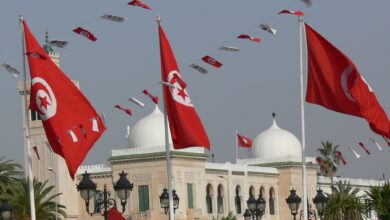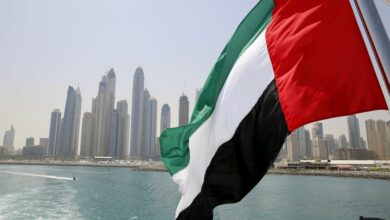Cairo's stock index tumbled to an 11-week low on Wednesday on fears of contagion from unrest that toppled Tunisia's president and further volatility is expected as investors eye Egypt's 2011 presidential election.
Cairo's main benchmark .EGX30 has fallen more than six percent this week, wiping out the gains of late 2010 and confounding many analysts who have picked Egypt, along with Qatar and Saudi Arabia, as the top equity picks in the Middle East for 2011.
Yet Egypt remains attractive as a macroeconomic play, despite regional turmoil.
"Selling seems to be coming from all directions," said Simon Kitchen, a strategist at EFG-Hermes in Cairo.
"Retail investors are strong sellers, which is shown by many of the small- to mid-cap stocks doing particularly badly, while the proprietary desks at foreign institutions are also selling.
"Institutional investors interested in Egypt are waiting to see what happens – why stick your neck out and buy now?"
Commercial International Bank fell 5 percent this week, while other major losers included Orascom Telecom and Ezz Steel.
On Tuesday, an Egyptian man set himself on fire near parliament, following a similar incident in Tunisia which provoked mass protests that helped oust president Zine al-Abidine Ben Ali after 23 years of rule. Similar cases were reported in Algeria and Mauritania.
"A lot of people want change in the region, but do not know exactly what that would mean — regional political risk has risen sharply over the past week," said Angus Blair, Beltone Financial's Head of Research.
Tunisia's troubles, the collapse of Lebanon's government, food price protests in Jordan and a secession referendum in south Sudan have all contributed to this, said Blair.
"But this is not a homogenous region and we need to look at each country individually," he said. "The changes in Tunisia means there will be long-term political changes in the Middle East and North Africa, but I'm more concerned about developments in Lebanon in the short term."
Across the Middle East, there is little real democracy and although there were parallels between the autocratic regimes of Tunisia's Ben Ali and that of Egypt ruler Hosni Mubarak, who has been in power since 1981, Egypt is unlikely to be engulfed in a similar uprising.
"Egypt is cash rich and while there is unemployment, it also has a very diversified economy…the informal economy is massive. Tunisia's economy and commerce was more policed and regulated," said Beltone's Blair.
"Egypt has a much freer economy and the media has seen much more openness over the past few years. Almost all political groups have their own voice and a means to let off steam, unlike Tunisia."
Egypt's economy is forecast to expand 5.4 percent in 2010 to 2011 and 5.5 percent the year after, growth forecasts only Qatar can better in the Middle East.
"There's a big buying opportunity for traders over the next few days because stocks are cheap and well supported by decent dividend yields," said Blair.
Some fund managers were more wary, with Tunisia seen as the trigger for an over-due correction after an off-budget stimulus plan helped Egypt benchmark's rise 15 percent in 2010.
"We did not have a significant exposure to Egypt. Valuations were not cheap anyway," said Fadi Al Said, portfolio manager for ING Investment's US$95 million Middle East North Africa (MENA) fund in Dubai.
Following disputed parliamentary elections in late 2010, Egypt will hold a presidential vote this year. Incumbent Mubarak, 81, has not yet stated whether he will stand again, adding to investor uncertainty.
"The Egypt market will be volatile this year, but recent political turmoil has not changed fundamentals and a lot of Egypt stocks are becoming more attractively priced," said EFG's Kitchen.
"The presidential election was a factor before the Tunisia troubles and we expect it to periodically affect the market."
Political unrest has also hurt the Egyptian pound.
The currency weakened to its lowest level against the dollar in near six years on Jan. 17, the first European business day after the Tunisian president fled. Traders said it will continue to decline in the coming week.
"It depends a lot on what the central bank will do to counter the outflow that will come, if they will sell dollars to the market," said a currency trader based outside of Egypt.
Egypt's central bank regularly intervenes through a small number of banks to keep the pound steady against the dollar, but it allows the currency to track longer-term changes in demand.




